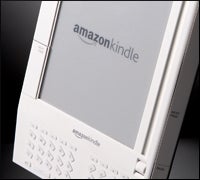 |
| Amazon Kindle E-Book reader Source: Amazon |
Electronic reading devices are gaining converts but are unlikely to replace the printed book and will have to compete hard with other ways of consuming digital media, exhibitors at the Frankfurt Book Fair said.
Sales of electronic readers such as Amazon’s Kindle and Sony’s Reader have been growing fast, prompting smaller companies to introduce their own prototypes at the fair and publishers to step up the digitalization of their books.
The gadgets, small and light enough to fit into a handbag, can eliminate the need to carry around books and newspapers by accessing texts from the Internet to be read on a display screen at the user’s convenience. Some also come with Wi-Fi connection.
Some believe they could galvanize the market for digital text in the way Apple’s iPod did for digital music.
Penguin publishers CEO John Makinson told Reuters: “They have become mainstream in the sense that they are a genuine consumer product for which there is real appetite, so this is not the province of geeks any longer.”
Makinson said Penguin was now publishing all new titles both as printed books and e-books and was digitalizing its backlist.
Technology research firm iSuppli predicts that global e-book display revenue will grow to $291 million in 2012 from $3.5 million in 2007.
Fair exhibitors said e-readers were mainly used by scientists and early adopters at the moment, but were ideal for reducing the carry loads of commuters, students and travelers.
Dutch firm Polymer Vision wowed visitors at the fair with its “Readius” prototype, which has a foldable display.
Ronald Schild, head of MVB, a leading service company for the German book industry, told Reuters the e-book would not replace the printed book, but it would have certain advantages.
“My children will still read their picture books as a printed book but I am not sure they will take a 5 kilo [11 pound] rucksack to school,” Schild said.
Green enthusiasts may also be swayed by the argument for e-readers, as they are not backlit, use little energy and could contribute to reducing paper consumption.
“Basically, it doesn’t use energy unless you turn a page electronically,” said Jeffrey van Ede, head of Sony Germany.
Cheaper alternatives?
But some think the price tag that comes with e-readers will prevent it from becoming mainstream, especially in the current economic climate.
“The financial crisis is going to slow down the purchase of e-readers,” said Francoise Dubruille, director of the European Booksellers’ Federation.
Some, however, believe mobile phones could prove more popular as a display for reading digital content than e-readers as most people already have one, and they provide opportunities for readers to interact.
“South African publishers … told me they expect the mobile to be the next big thing to read. Everybody has a mobile in South Africa, so they are preparing content for these mobiles,” said Juergen Boos, director of the Frankfurt Book Fair.
“An e-book reader costs $300, $400. There is not a market [there] for that,” he said.
In Japan, short stories specially written for mobile phones are already being sent to readers in installments, and Apple’s iPhone also allows users to read their novels on a mobile.
Publishers and technology specialists at the fair said readers would have a choice of devices on which to read e-content, ranging from e-readers and PCs to digital watches.
“Increasingly, you’re going to simply download from the Internet to whichever device that’s your preferred point for reading those books,” said Alan Adler, chairman of the American Publishers’ Association copyright committee.
But many readers and writers say that the practicality and novelty of e-books will never replace what books offer to the senses.
“When I look at the standard of today’s technology, then I can’t imagine using an e-reader, no,” said Nobel-Prize winning author Orhan Pamuk, who has collected 70,000 tomes in his Istanbul library.
“But one day … when technology manages to create the perfume of books, of old books, then yes, maybe.”


